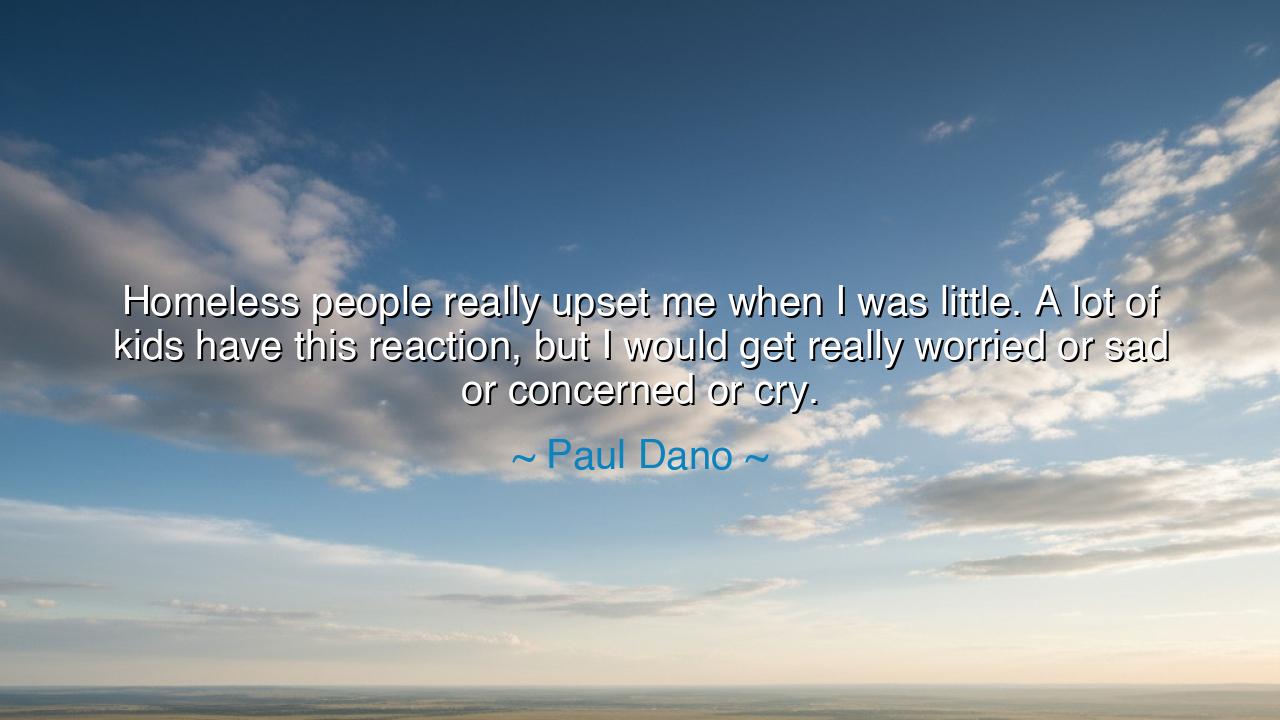
Homeless people really upset me when I was little. A lot of kids
Homeless people really upset me when I was little. A lot of kids have this reaction, but I would get really worried or sad or concerned or cry.






Paul Dano, a man whose craft is to dwell in the hidden places of human souls, once revealed the tenderness of his childhood heart: “Homeless people really upset me when I was little. A lot of kids have this reaction, but I would get really worried or sad or concerned or cry.” These words, though simple, speak of the raw compassion of a child, unguarded by cynicism, untrained in the cold indifference that adulthood so often demands. For to the innocent heart, suffering cannot be ignored—it pierces, it unsettles, it demands a response of tears.
The origin of such sorrow lies in the natural empathy of children. Before the world teaches them to look away, they look directly. They see the person sleeping on the sidewalk, not as a stranger, but as a human in pain. Their small hearts cannot reconcile the contrast between comfort at home and deprivation in the street. Thus, like Dano, they are moved to worry, to sadness, to tears. In this, they remind us that compassion is not learned but innate, planted within us from birth, and only dulled with time if we let it.
History has witnessed such tender spirits before. Consider Francis of Assisi, who as a young man was shaken by the sight of lepers and beggars. While others recoiled, his heart broke open, and in embracing the poor, he discovered his life’s calling. What for many was cause for avoidance, for him became the doorway to holiness. Dano’s childhood grief mirrors this same truth: that the pain we feel at the suffering of others is not weakness, but the seed of vocation, calling us to mercy and action.
Or recall Charles Dickens, who as a child saw the grinding poverty of London’s streets. The faces of the homeless and destitute haunted him. Later, through his novels, he gave voice to those very souls—Oliver Twist, Tiny Tim, the forgotten poor—so that readers might share the sorrow he once felt. His empathy as a child became his weapon as a man, wielded not with sword but with story, to pierce the conscience of society. Dano’s words remind us that such sorrow in youth is not meaningless—it can be the beginning of lifelong advocacy.
The deeper meaning of this confession is that compassion is painful. To feel sorrow at the plight of the homeless is to suffer with them in spirit, even if only for a moment. Many adults grow hardened, avoiding this pain by closing their eyes, but the child’s tears show a purer path. In Dano’s memory, there is both sadness and wisdom: the sadness that suffering exists, and the wisdom that true humanity is found not in ignoring it, but in allowing ourselves to be wounded by it.
The lesson for us is clear: do not despise the tears of compassion, whether in yourself or in others. Let them teach you. If suffering still unsettles you, count it as a gift—for it means your heart has not grown numb. If you find yourself hardened, seek to awaken again the child within you, who once cried at the sight of hunger and homelessness. For it is only the soft heart that can change the world; the hard heart perpetuates its cruelty.
Practical wisdom follows: when you encounter those in need, do not turn away. Offer what you can—your time, your resources, your voice. Support shelters, give food, extend kindness. Even if your action is small, let it flow from the same well of compassion that made Dano weep as a child. In this way, your empathy becomes not just emotion but transformation, turning sorrow into service.
Thus Paul Dano’s words endure beyond a childhood memory. “Homeless people really upset me when I was little… I would get really worried or sad or concerned or cry.” They remind us that true humanity begins with such tears. To weep at another’s suffering is not childish—it is the most grown, the most ancient, the most divine act of all. Let us then reclaim that innocence, and let our compassion guide us, until the sorrow we feel becomes the healing the world so desperately needs.






AAdministratorAdministrator
Welcome, honored guests. Please leave a comment, we will respond soon